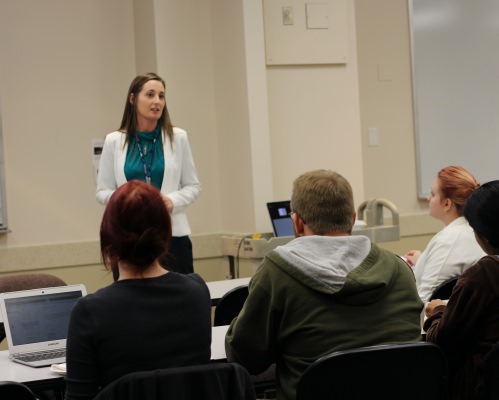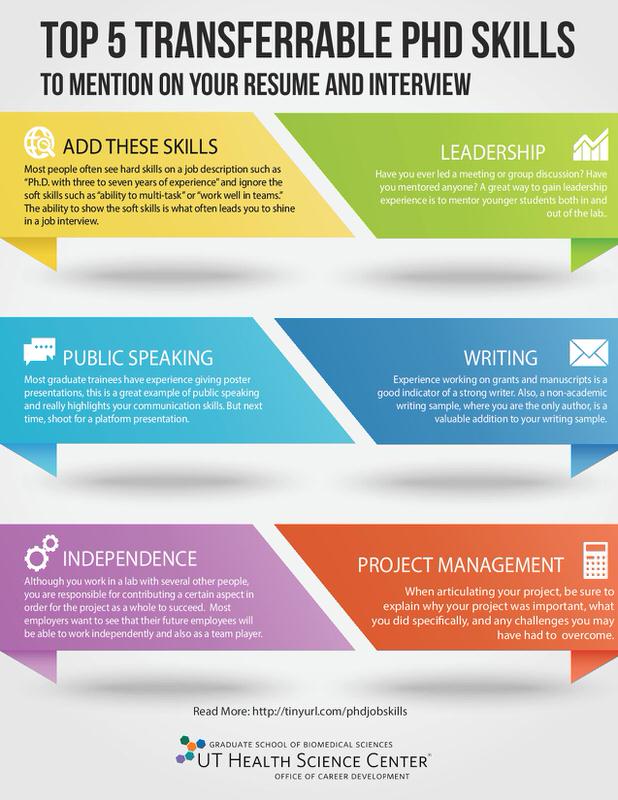The Career Series: Top 5 Transferrable Skills From Your Ph.D.
 “The two most common
“The two most common
misconceptions about graduate students and postdoctoral fellows is that everyone
wants to remain in academia and that a graduate degree will only prepare you
for a job in academia,” said Dr. Teresa Evans, director of the Office of Career Development at the Graduate School of Biomedical Sciences at UT Health Science
Center San Antonio.
Dr. Evans explained that several factors have impacted career
planning for those who have a Ph.D. The first that often comes to mind is the
decrease in funding but the lesser thought about but still a reality is that a
career in both academia and industry is not a guarantee just because you have a
terminal degree.
“This doesn’t mean that there are no jobs out there, or that
you will not get the job that you want. I am a firm believer that all graduate
trainees can become whatever it is that they wish to become. But what these realities tell us is that you need to
work very hard, have a plan, and articulate the transferrable skills that you
have, by virtue of your graduate training,” Dr. Evans said.
Top 5 Transferrable
Skills From Your Ph.D. and Graduate Education
(to mention in your
interview and on your C.V. and/or Resume)
1) Writing— Experience working on
grants and manuscripts is a good indicator of a strong writer. If you have published
a paper or been a co-author, this is an excellent addition to your portfolio.
Also, a non-academic writing sample, where you are the only author, is a
valuable addition as it can support your ability to translate your research for
alternative audiences. If you are
interested in this look to blog, not unlike this one, to write a piece. Contact Charlotte Anthony, if you are interested in writing for the Pipette Gazette!
2) Public SpeakingaMost graduate trainees have
experience giving poster presentations, this is a great example of public
speaking and really highlights your communication skills. But next time, shoot
for a platform presentation. This is an
ideal way to support your strong communication skills. In addition to scientific audiences, be sure
to get some experience speaking to the general public and in a classroom
setting to articulate your ability to communicate your work to a varied
audience.
3) LeadershipaHave you lead an experiment
from start to finish? Have you been in charge of a project and guided others?
Have you ever led a meeting or group discussion? Have you mentored anyone? A
great way to gain leadership experience is to mentor younger students both in
and out of the lab.
4) Project Management—Do you have
specific projects you have worked on which show your ability to understand and
synthesize large quantities of data? When articulating your project, be sure to
explain why your project was important, what you did specifically, and any
challenges you may have had to overcome. For example, if your experiment
failed, what did you do? Did you try it the same way or different? These
vignettes are often a good way to show your soft skills in addition to articulating
your technical skills. By fact of completing a dissertation or thesis you have
managed a project! Now you just have to convince others that you managed it
well.
5) IndependenceaAre you able to work
effectively with limited supervision? Do you have examples of working and
solving problems by yourself without needing guidance? Most employers want to
see that their future employees will be able to work independently and also as
a team player. An example to show this might be to explain that although you
work in a lab with several other people, you are responsible for contributing a
certain aspect in order for the project as a whole to succeed. Group and team
work is key as science and innovation move forward not by the efforts of a
single person but by the efforts of a group as a whole.
Now that you know what these skills are you have to learn how to make
them clear to employers.
 Dr. Evans explained that before looking for a job,
Dr. Evans explained that before looking for a job,
make sure that your transferrable skills are visible on your resume.
“Most people often see the hard skills such as Ph.D. with three to seven
years of experience (orange) and ignore the soft skills such as ability to
multi-task or work well in teams (yellow),” Dr. Evans said. “This is a huge
mistake because the ability to show the soft skills is what often leads the
candidate to shine in a job interview.”
For more information on how to plan for your career, see here. If you would like one-on-one career consulting, please email Dr. Teresa Evans. More resources: the full powerpoint presentation or career worksheet.

